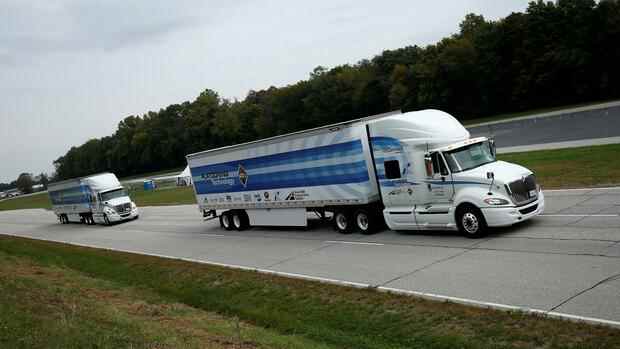Dusseldorf So far, it has resembled a playground for nerdy tinkerers. In April 2016, pairs of trucks from the manufacturers MAN, Scania, DAF, Iveco, Volvo and Daimler rolled towards Rotterdam in a rally. The rear vehicle was linked to the respective lead truck via WLAN, radar and GPS, which degraded the second driver to an inactive extras.
Three years later, MAN and DB Schenker started a long-term test on the A9 motorway between Munich and Nuremberg. For seven months they tried out the electronic coupling of several trucks, known by experts as platooning. The driver of the first truck set the pace and direction, the others followed him automatically. The steering and braking commands were transmitted by WLAN and G5 radio to the following vehicles so that there was no risk of a rear-end collision in the event of an emergency braking.
Since then, (partially) autonomous truck driving has become quiet, apart from a manageable test in the Port of Hamburg. According to the industry, there is no business model. In addition, if there is no special permit from the Bavarian Minister of Transport, as is the case on the A9, the legal framework is inadequate for such journeys. The fact that the technical requirements across Germany – above all coverage with the 5G mobile communications standard – are incomplete, makes things even more difficult.
But transport companies should reconsider the matter of the business model, and modernization would also be good for the legal framework. Because in the medium term, the logisticians threaten to run out of the most important resource: the drivers. 60,000 to 80,000 of them are missing in Germany, with the gap growing by 15,000 every year. With the help of such figures, it is already possible to calculate when things like those in Great Britain will come about here. There, supermarket shelves and petrol pumps remain empty because there is a shortage of 100,000 truckers in the country.
Top jobs of the day
Find the best jobs now and
be notified by email.
An image campaign in Germany is unlikely to be enough to bring the number of road captains back up. Modest wages, poor working conditions and cheap competition from foreign transport companies speak against it.
Instead, in addition to platooning, it could help to reduce truck journeys through digitization. The Federal Ministry of Transport has now reported that a worrying 28 percent of the almost 24 billion truck kilometers on Germany’s roads were driven empty in 2020. The professional use of electronic freight exchanges, which also broker cargo for return journeys, could drastically reduce the quota. However, those who rely on their fax machine as a freight forwarder, like most, are punished by the lack of drivers.
More: The next delivery bottleneck: the containers are stuck in Hamburg, Rotterdam and Antwerp
